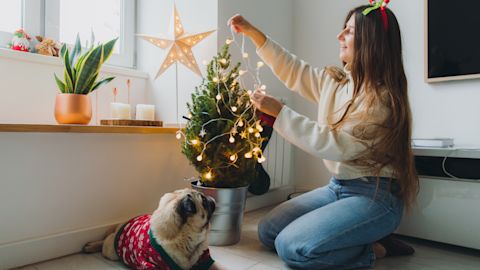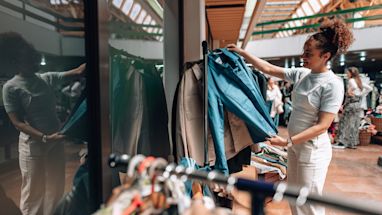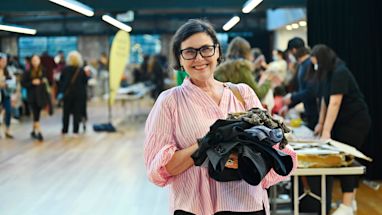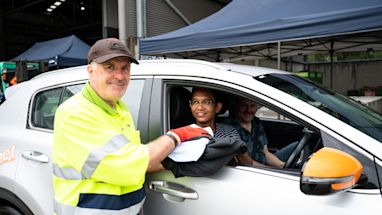In our local area, we fill about 70 extra garbage trucks over the holiday season, so we’ve created a sustainable guide for Christmas.
1. Keep it real – a potted native Christmas tree is the most sustainable option
Real Christmas trees are best for the environment.
Most plastic trees are imported, break after a few years and end up in landfill. If you already have a plastic Christmas tree, use it for as long as you can. If it breaks, try and repair it. YouTube and iFixit have some helpful tutorials. If you’re still set on a plastic tree, choose a second-hand one from your local op shop, Facebook Marketplace or eBay.
A potted native tree, like a Woolly bush or Wollemi pine, looks similar to a traditional pine tree and is widely available at local nurseries. They can last a lifetime if you take good care of them and are the most sustainable choice of Christmas tree for both the environment and your wallet.
A fresh-cut tree is a good option if the supplier plants more than one seedling for every tree they cut. After Christmas, you can recycle them in your green lid bin or book a free pick-up.
A fun alternative in small spaces is a hanging branch tree for your wall.

2. Memories make the best gifts
Experiences make memorable, sustainable gifts. Check our official event guide, What’s On, for great local options like art workshops, theatre tickets and classes.
Earn brownie points from your loved ones with thoughtful IOU vouchers. You can get creative with what you ‘owe’ – a sunset picnic on Observatory Hill, a game of pickleball at KGV or breakfast in bed. Try making vouchers from scrap paper or print your own – there are plenty of free templates online.
3. Gift-giving games save you money and reduces waste
For big family gatherings or the workplace, consider gift-giving games like White Elephant and Secret Santa. They’re fun and you only buy one gift instead of many. Use an app like Elfster or draw names to create and share wish lists – a great way to avoid unwanted gifts.
Reusable water bottles, coffee cups and beeswax wraps are perfect Secret Santa presents to help your friends and family reduce their waste all year. Gifting something handmade, such as a baked treat, jam or crafted piece, is personal, thoughtful and creates less waste than a store-bought item.
Get help from experts
For more sustainable Christmas ideas, have a chat to our waste avoidance experts at one of their pop-up stalls:
- Surry Hills Library, 405 Crown Street: Wednesday 26 November, 10am–12pm
- Glebe Library, 186 Glebe Point Road: Thursday 27 November, 10am–12pm
- Town Hall House, level 1, 456 Kent Street, Sydney: Wednesday 3 December, 11am–1pm
- Kings Cross neighbourhood service centre, 50–51 Darlinghurst Road: Thursday 4 December, 1pm–3pm
- Darling Square Library, level 2, 1 Little Pier Street, Haymarket: Thursday 11 December, 2pm–4pm
- Green Square Library, 355 Botany Road, Zetland: Thursday 18 December, 2pm–4pm

4. Wrap to reuse
There are many clever ways to wrap gifts sustainably. Save gift bags, boxes and baskets you receive and reuse them next year. Just remember to remove any gift tags or cards. You can even reuse wrapping paper if you’re extra careful when opening presents.
Gifts wrapped in school artworks by your kids look beautiful under the tree. You can also cut up brown paper shopping bags and turn them inside out so the branding is hidden. Try the Christmas paper bag at Woolworths, which features a Christmas print and scissor lines to show you where to cut. Decorate them with ribbon, string or leaves.
Or wrap your gift in something that can be used all year round, like a tea towel or fabric from around your home. Finish them off by making gift tags by cutting off the front of last year’s Christmas cards.
5. Transform and preserve your leftovers
If you find yourself with a fridge full of leftovers on Boxing Day, follow these simple tips to preserve them for longer. You may be surprised how many foods you can freeze. And if you’re fed up with ham and turkey sandwiches, try these recipes to give your leftovers a new flavour.
A guide to Christmas recycling
If you have unwanted wrapping, trees or gifts, find out how to dispose of them responsibly in our Christmas recycling guide.
Published 18 November 2021, updated 5 November 2025



